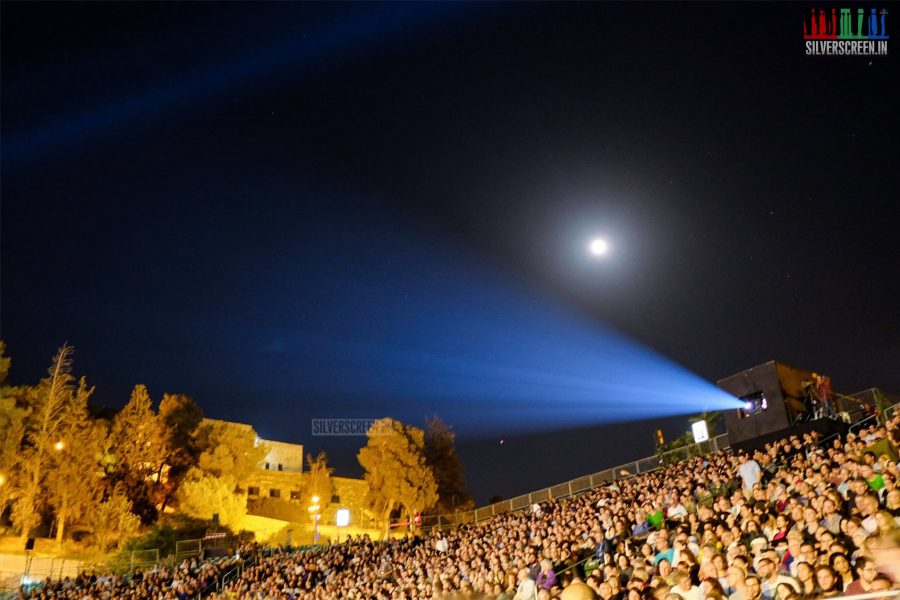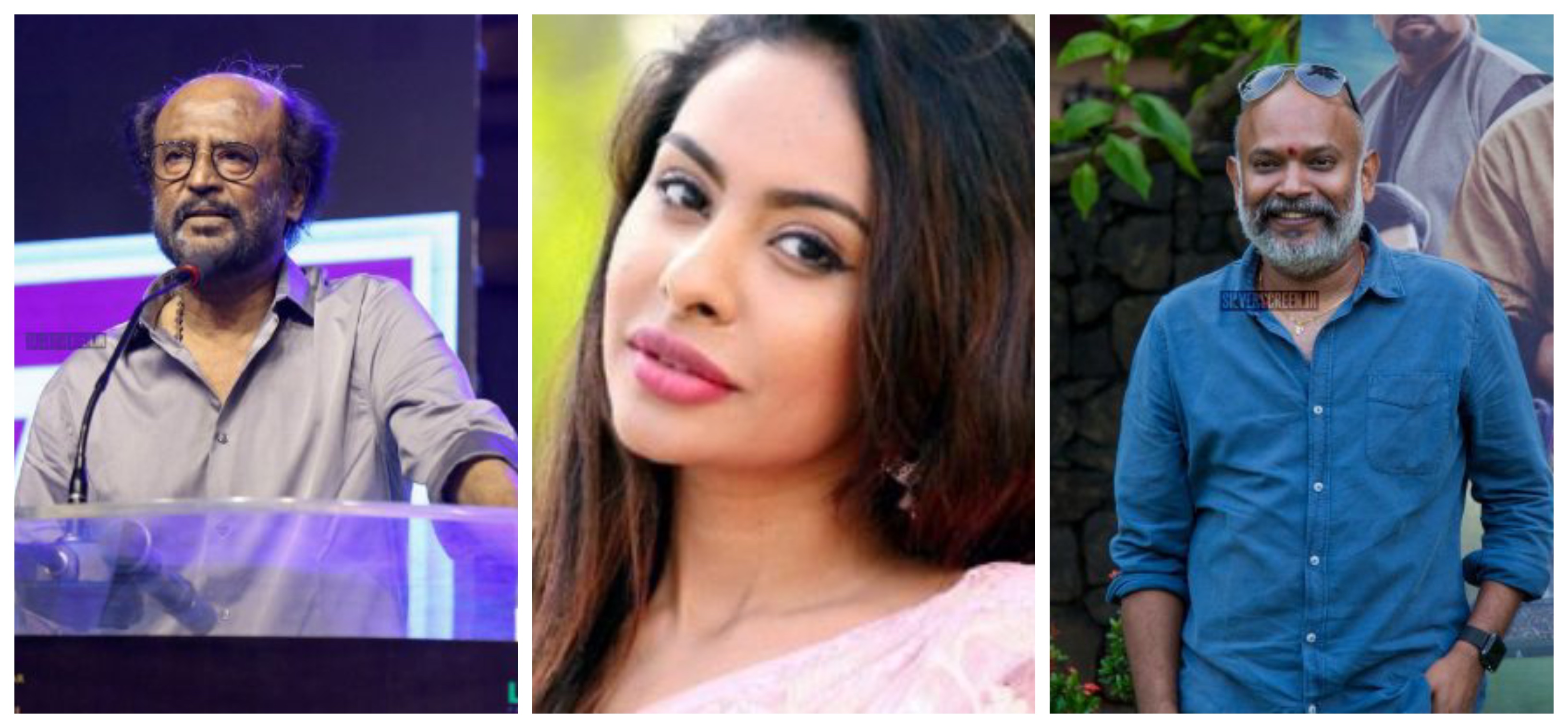The recent edition of the Jerusalem Film Festival was notable for the number of local films it featured on the orthodox religious communities in Israel. Coming from an industry that is largely characterised by its Left leanings and secular cinema, it might well represent a shift in the country’s socio-political thought. Our last dispatch:
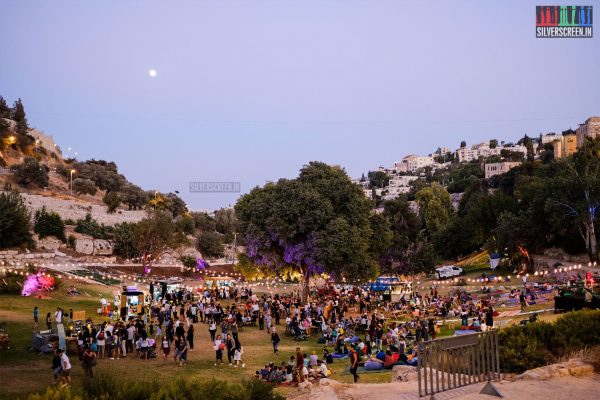
In Jerusalem, nothing is really far away. From a small footbridge above the Cinematheque, the modern building which serves as the chief venue for the Jerusalem Film festival, you can see the grey-coloured West Bank barrier bathing in the summer sun. Adjacent to the Cinematheque is Sultan’s Pool – an amphitheater which used to be a water basin in the ancient times – where the opening ceremony of the film festival is held every year. A highway separates it from the majestic Old City, the birth place of three prominent religions in the world.
On July 26, as the 35th edition of the film festival commenced under the moon-lit sky at Sultan’s Pool, a crowd of several thousand delegates and guests watched The Unorthodox, a Hebrew entertainer, alongside a large number of ultra-orthodox Jews who are rarely seen at film screenings in the city, let alone at film festivals. The film, which narrates the formation and rise of Shas, the country’s powerful ultra-orthodox political party, is without the sombre air that usually characterises political-dramas. The narration is hip and humorous, with the audience laughing out many a time. The film, directed by Eliran Malka, is centered around Ya’akov Cohen, a nondescript printing press owner who played a key role in the formation of Shas but was pushed to the sidelines soon by his co-workers.
Malka is a graduate of Israel’s Ma’aleh School of Television, Film and Arts where a majority of students are religiously observant Jews who prefer not to work during Shabbat. His film is populated by similar characters from the country’s ultra-orthodox community, but it portrays them in an unconventional, casual light, breaking the stereotypical representation of religious people.
The selection of The Unorthodox as the opening film was unusual for the festival which had, in most of the previous years, gone for a popular foreign title. “We could have opened the festival with a foreign film this year too. But this is a quintessential local film. It narrates an interesting and important story,” said Noa Regev, the director of the film festival and the Jerusalem Cinematheque. “And for the first time, there were many people from the orthodox Jewish community among the audience, which was nice as well.”
This year, the festival featured around 180 films from 60 countries, and held sidebar events like masterclasses and ThinkFest (discussions) while JFF On The Go, a mobile cinema that toured Jerusalem neighborhoods, showcased some popular world movies.
There was also Pitch-Point, a fund-raising platform for Israeli work-in-progress projects. The 13th edition of Pitch-Point saw filmmaker Avishai Sivan’s Lot’s Wife winning the inaugural Goralska Award which came with a prize money of 23,360 USD (Rs 16,00,000 approx). The film, a fantasy, is centered on an orthodox Jewish couple who births a child with two heads. Sivan’s previous project, Tikkun, was an internationally-acclaimed monochromatic horror drama set in an orthodox Jewish community. It won the Best Feature Film award at the Jerusalem Film Festival in 2015.
*****
Every year, there is a common theme – a trend of sorts – at the festival, explained Regev. “A couple of years ago, it was feminism. There were many films made from a feminist perspective; many were by women filmmakers. It isn’t a conscious curatorial decision to choose such films, but it happens by chance. This year, we have noticed that many entries are about the orthodox Jewish world.”
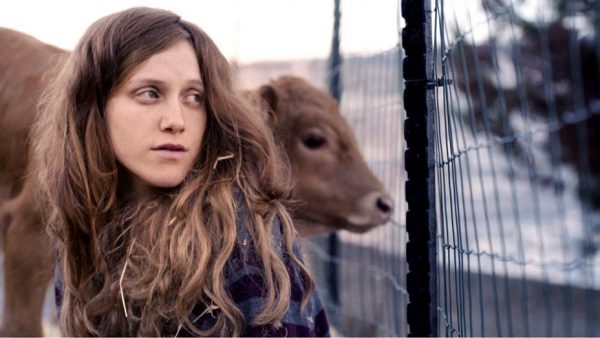
The Israeli film that won the top prize at the festival, Red Cow, directed by Tsivia Barkai Yacov, offers a rare view into the world of religious extremists in East Jerusalem. Centered around a 17-year-old girl, Benny, who finds a lesbian partner while living within the rigid religious community, Red Cow, is a rebellious debut film. On the foreground, it is an intimate personal drama, while on the background, a crucial political issue is discussed with much sensitivity. The film, which premiered at the Berlin Film Festival this year, won The Haggiag Award for Best Israeli Feature Film and the Anat Pirchi Award for Best Debut Film. Avigayil Koevary, who plays the protagonist, won the Haggiag Award for Best Actress.
Redemption, another Israeli film in the competition section, is about a newly-observant rock musician who has to get his old band back together to raise money for his daughter’s medical treatment.
This is 36-year-old Regev’s fifth year as the festival CEO. She took charge as the head of the festival in 2014, a crucial year when the city was hit by air raids and terror threats which resulted in last minute cancellation of attendance by several international guests and delegates. In the last five years, Regev and her team have fought many odds to put together a grand, well-organised event that celebrates local and international cinema, offering a unique view into the country (20 per cent of the films screened are Israeli films), as well as a chance to watch some of the excellent foreign titles from major film festivals such as Berlin and Cannes.
It’s not easy, of course. At a meeting with the press delegation, Regev said, “Jerusalem is quite a complex venue to host a film festival.” To put it simply, the celebration of world cinema happens on the sidelines of a long-running conflict. There have been boycotts and protests against the festival in the previous years. Beneath the beautiful and calm crust of the modern city runs a turbulent current of politics. Just a week prior to the film festival that began on July 26, the country’s parliament passed a controversial bill that identified Israel as a Jewish state, spurring protests from its Arab population and secular Jewish groups who opine that it validates the apartheid accusations against the state. The law also names Jerusalem – a city that is also claimed by Palestine – as the complete capital of the Jewish state of Israel. A day before the festival began, there were clashes reported at the holy mosque of Al Aqsa between Muslim worshipers and Israeli troops after noon prayers.
However, Regev declared that international politics is not the most challenging barrier in her job. “We don’t worry a lot about politics while curating films. That kind of discussion happens mostly in the media.” There are barely any Palestinian films at the festival. “Filmmakers don’t want to screen their films here; sometimes they want to, but it’s not easy…”
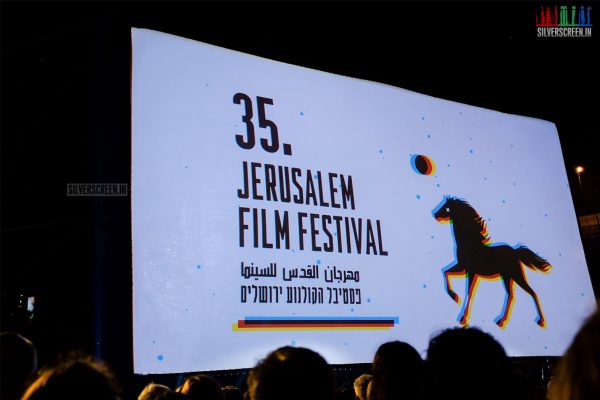
One of the most popular films at the festival which concluded on August 5, was Oslo Diaries, a documentary directed by Mor Loushy and Daniel Sivan, that gives a stunning behind-the-curtains view of the Israel-Palestine peace accord in 1990 that aimed to bring peace to an ever-tumultuous territory, yet was thwarted tragically. The film relies on the personal diaries of senior Palestinian, Israeli and American officials who participated in the talks. The brilliantly researched and cut film doesn’t shy away from touching upon the subtle role played by the now reigning prime minister Benjamin Netanyahu in the assassination of Yitzhak Rabin, a prominent figure in the peace talks who even won a Nobel Peace Prize for his efforts. Oslo Diaries won Dalia Sigan Award for Screenplay at the film festival.
For Regev though, the hardest part of her job is to find the funds to keep the festival running. “To retain the financial partners, to convince them to continue doing what we do the best.” The film festival has around 12 competition sections; the biggest prize money amounts to around 30000 USD (Rs 18,60,000 approx).
*****
In spite of the murky politics, conflicts with Palestine and the presence of conservative religious groups, Israel is home to one of the most LGBT-friendly cities in the world – Tel Aviv – which is approximately 66 kilometers away from Jerusalem. It was during the course of the festival that Jerusalem celebrated its annual Gay Pride Parade. At least 20,000 people poured out on the streets of the city, painting it in rainbow colors. Even days ahead of the Pride Parade, rainbow flags could be spotted in many parts of Jerusalem – on the streets, traffic signals and shop facades. The March does not take place without challenges. The LGBT groups face stern opposition from ultra-orthodox political parties who, in July, laid pressure on Prime Minister Benjamin Netanyahu to vote against a bill that would have let gay couples to have children via surrogacy. In July last week, Israel’s radical Lehava organization had called the members of the LGBT community ‘terrorists’, and during the March, they had staged a protest against the Pink Show.
Besides Red Cow, another film on the subject of homosexuality won the top award at the festival this year. Tomer Heymann’s Jonathan Agassi Saved My Life, a documentary that chronicles the life of Jonathan Agassi, a global gay porn star from Israel, won the Van Leer award for Best Israeli Documentary Film. Heymann had previously made a critically-acclaimed film, Who’s Gonna Love Me Now, about a gay HIV-positive Israeli man living in London.
*****
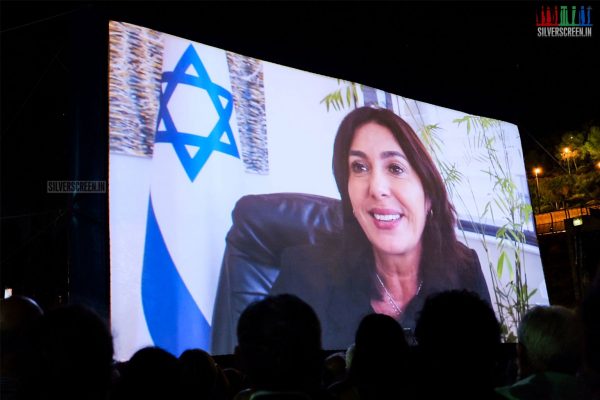
Of late, the film fraternity in Israel has found a new rival in the country’s incumbent Minister for Cultural Affairs, Miri Regev. At the opening ceremony, no politician was present on stage. “Until two years ago, we used to ask politicians to be on stage. But we changed it, and gave them a video slot instead, to send greetings,” said Noa Regev, smiling at the press delegation.
It’s not hard to see what changed it. At the opening event this year, much to the amusement of the foreign delegates, a loud boo emerged from various corners of the gallery as a prerecorded video featuring Miri Regev started playing on the giant screen. Regev’s animated description of her favourite romantic film, Casablanca, was rendered almost inaudible in the chaos. She was also greeted with boos from the audience at the opening ceremony in 2016 when she was physically present on stage with guests such as Hollywood filmmaker Quentin Tarantino. At the 2016 Ophir Awards event, which saw Arab film Sand Storm bagging most of the prizes, Regev walked out when Arab-Israeli rapper Tamer Nafar performed a poem by the late Palestinian poet Mahmoud Darwish.
Recommended
Regev is a controversial figure for her continuous attempts to rein in the Israeli film industry. In 2017, citing the example of Foxtrot, an Oscar-nominated army drama, she demanded that Israeli films be censored to check content that goes against the Jewish state interests. Many a time, she had threatened to cut state funding for cultural productions and organisations that appear to be disloyal to the Jewish state. Most recently, her attempts to amend the country’s law to gain control of film funding, was stalled by the Opposition at the parliament. One among the several films that have earned her ire is Megiddo which tells the story of Palestinians in Israeli prisons for security offenses.
Featured image: A scene from the opening ceremony of the 35th Jerusalem Film Festival which concluded on August 5.
*****
Read our first report from the film festival here. Silverscreen covered the event as part of a 14-member team of film critics and journalists from across the world.
